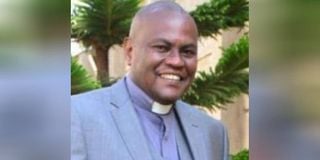Death of Catholic priest exposes injustices of the defamation law

Catholic Priest Joseph Kariuki who died under mysterious circumstances at a guest house in Murang'a County.
I should have told this story two weeks ago. I blame the delay on the Azimio demonstrations. But it’s never too late to make a valid point. Let me begin at the beginning.
Three Court of Appeal judges said in a judgment in 2016 that once a person dies you can say anything you want about them. “The dead have no rights of reputation and can suffer no wrong” (Civil Appeal No. 104 of 2009).
The judges—Martha Koome, GBM Kariuki and James Otieno-Odek—were just interpreting the Law Reform Act, which says a defamation suit doesn’t survive a dead person. This is the reason why the media get away with defamatory stories about the dead.
The latest and most notorious example is the story “Catholic priest dies under mysterious circumstances at Murang’a guest house” (Nation.Africa, July 10, 2023). The story, by Mwangi Muiruri, claims Father Joseph Kariuki literally sinned in God’s sight by allegedly having sexual intimacy in a hotel room.
Where is the evidence? Mwangi says Fr Kariuki left his Ruai parish in Nairobi City County accompanied by “his 32-year-old girlfriend.” He checked in the three-star Monalisa Hotel in Murang’a “as a good hideout to have a good time.” Then “tragedy struck on Saturday morning when he died under mysterious circumstances, exposing his ‘randy’ adventure as contrary to the priestly call”.
Mwangi, who previewed my earlier draft of this article, told me there was good evidence.
Prosecuted his case
“The dead priest ably prosecuted his case when all evidence was that he was in a room that had a bed together [with the woman] for a whole night and he was naked when he was removed for his journey to hospital,” he said.
“The woman—whose identity I concealed—indeed confessed that they were in the privacy of those concrete walls to have [sexual intimacy] and they had been doing it for the past six years.”
Wow! What evidence! The important thing, though, is not whether Fr Kariuki had [sexual intimacy] . It’s that the Nation wouldn’t have dared publish such a story for fear of being sued for defamation and violation of privacy if Fr Kariuki were alive—if not for fact that it was not in good taste.
Fr Kariuki had a right to privacy and good reputation. Nicknamed “Father Karis”, he was a respected religious leader both in St Peter’s Catholic Parish, Ruai, and his rural home in Mang’u, Kiambu County. Had he lived, Fr Kariuki would have been able to sue, with a high probability of success.
However, upon his death, Fr Kariuki lost the right to sue for defamation and invasion of privacy. Even his church or members of his family can’t sue on his behalf. The media, therefore, could—and did—say anything they wanted about him without legal consequences.
The Law Reform Act enables writers to say things about the dead that they would never have been able to say without risking libel when the persons were alive.
Investigative reporter John Kamau takes advantage of this law to write defamatory stories about the dead. A recent example is “Lessons for Gachagua from Karanja’s fall and why DP should slow down” (Sunday Nation, May 21, 2023), which describes Kuria Kanyingi, a former Limuru MP, as a “corrupt” person “who had loads of unexplained cash”.
Another is “Fate catches up with trickster billionaire Joseph Kiarie Mbugua, who owns Jubilee Party HQ” (Nation.Africa, September 5, 2022), which literally calls Joseph Kiarie Mbugua a thief, a man who “used trickery to acquire most of his wealth”.
The media benefits from the law even when they defame a living person but he dies before the case is concluded. This is what happened when Coast politician Karisa Maitha sued the Nation for defamation.
The Nation failed to file a defence within the prescribed time and the court ruled in his favour in an interlocutory judgment, which is a temporary verdict. But Maitha died on August 27, 2004, before the final judgment. The Nation then successfully argued that the suit died with him.
A similar thing happened in the Gichuhi case. Stephen Maina Gichuhi sued the Nation for defamation. He died on June 24, 2015, before the case could be heard.
The law is an ass. It allows other causes of action, such as property claims, to survive a person. So why not defamation claims? It sounds unfair. But the upside is more freedom for the media.
- The Public Editor is an independent news ombudsman who handles readers’ complaints on editorial matters including accuracy and journalistic standards. Email: [email protected]. Call or text 0721989264.





